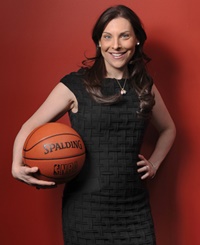Turnkey Search and sister company Turnkey Intelligence recently collaborated on a research study among employees in the sports industry, with the goal of examining perceptions on gender diversity in the workplace. Specifically, we wanted to home in on how viewpoints differ between men and women, as well as the perceived issues needed to be addressed by industry leaders and management. The results were presented during the recent Game Changers Conference.
The study comprised survey responses from more than 400 people who work within the sports industry; 55 percent male, 45 percent female. The respondents came from properties, agencies, brands, venues and other types of organizations. Survey invitations were distributed to a random list of SportsBusiness Journal/Daily subscribers.
The survey produced five key findings:
■ 1. Women are not as happy in their current jobs.
When asked to assess happiness in their current roles, 71 percent of male respondents defined themselves as happy; 57 percent of women felt the same.
How to diagnose the gap? Happiness within one’s job correlates with topics such as identifying and measuring success, feeling empowered, and feeling autonomous. Across these topics, there existed a noticeable gap. Only 29 percent of women felt “empowered to do [their] job effectively and autonomously,” but 47 percent of men said the same. And just 24 percent of women knew exactly how their organization would evaluate their job performance, compared with 36 percent of men.
A key to women feeling happier in their jobs relates to clear direction, goals and expectations from management. If a woman does not understand how performance is evaluated, how can she be sure she is successful in her job? Furthermore, when seeking a promotion, how should she articulate her successes and achievements to her boss (male or female) without a definition of success?
■ 2. Women believe it is harder to break in.
Specifically, 69 percent of women agreed with the idea that they have a tougher time getting into the industry. Men were more apt to disagree than agree.
Why? One reason strongly suggested by the data: the presence of a “good-old-boys’ network” within sports. A meaningful number of women voluntarily brought up this concept in essay question format. Examples of the verbatim responses:
• “The boys club that exists in our industry is pretty iron clad … ”
• “Sports remains a ‘good old boy’ network … ”
• “I think that there is a definite ‘boys club’ at my (company).”
 |
|
 |
TD Garden’s Latimer (left) and the NBA’s Jacobson exemplify how women have succeeded in sports sales roles.
Photo by: STEVE BABINEAU / BOSTON BRUINS; NBAE
|
A second theory on why women find it more challenging to break into sports, one Turnkey Search has noticed over years of recruiting: the reticence of women to take on a sales-focused role. Many women eschew sales roles for client service, account management, human resources, finance, community relations, etc. However, look at some of the top women executives in our industry — Amy Latimer at TD Garden, Gillian Zucker at Auto Club Speedway, Renie Anderson at the NFL and Rachel Jacobson at the NBA. They all came up through sales and/or have negotiated deals throughout their careers.
■ 3. Women believe it is harder to advance.
Again, a significant disparity exists regarding the ability for women to advance. Seventy-two percent of women disagreed that they have the same opportunity to succeed within sports, compared with 44 percent of men. Examples of women’s verbatim responses:
• “Each layer of leadership shows progressively less gender diversity … It intimidates me.”
• “[Recently] the only people to receive promotions at the senior level are men.”
Turnkey also queried respondents on the long-standing concept of the glass ceiling. Seventy-nine percent of women believe a glass ceiling affects them within the sports industry. What again struck us was how men were completely split: 40 percent agreeing, 40 percent disagreeing, 20 percent neutral.
The notion of a glass ceiling implies an obstacle to career progression caused by an absence of senior women in management. There are several great examples of women who have broken through the glass ceiling by not waiting for a promotion but asking for it (several mentioned above). If told you are not ready for a promotion, ask why not.
■ 4. Women desire mentorship and rotational opportunities.
Turnkey presented respondents with options that could facilitate advancement for women into senior roles. The two ideas that resonated strongest with female respondents were mentorship programs through their current employer (72 percent in favor) and rotational programs, where women work in multiple departments early in their career (53 percent). Both options make perfect sense, in that women want the opportunity to “learn and earn,” i.e. gain exposure and assistance that will allow them the ability to earn their way up the ladder.
■ 5. The sports industry is losing out with so few women in senior positions.
Turnkey could identify only two women in president/CEO roles within the major sports properties. Compare that with Fortune 1,000 companies, where 5 percent of CEOs are female. Greater progress can be made in the sports industry. When 40 to 45 percent of sports fans are female, the industry is missing executive leadership representative of nearly half of its fan base. Who speaks for their preferences and buying behavior?
What struck us in particular is the difference between men and women in seeing the need to proactively do something to even things out. Not surprisingly, 87 percent of women believed the sports industry needs to act to get more women into leadership roles, but only 55 percent of men agreed, meaning 45 percent of men don’t see this need. This is where the sports industry is really losing and has the opportunity to right itself.
Turnkey’s goal in conducting this research was to contribute to the dialogue about gender diversity in sports business. These results are diagnostic. They clearly uncover or verify topics where conversation will be required and achievement will ideally follow. But nothing will happen unless both genders embrace the notion and work toward action. The first step can be as simple as asking a young woman at your company, “Where do you want to be in five years?” To quote Sheryl Sandberg, “We cannot change what we are unaware of, and once we are aware, we cannot help but change.”
Steve Seiferheld (steveseiferheld@turnkeyse.com) heads the custom research division of Turnkey Intelligence. Follow him on Twitter @SteveSeiferheld. Carolyne Savini (carolynesavini@turnkeyse.com) leads the executive search division of Turnkey Search. Follow her on Twitter @CarolyneSavini.






